Brave New World (II & III)
I really enjoyed Chapter 2 and 3 because I was introduced to new characters and other settings than a boring London factory where humans are genetically engineered. I was introduced to Lenina and Fanny. Lenina is a promiscous woman which is normal in Huxley's Brave New World because everyone belongs to one another in society so there is no such thing as mothers and love, their is only satisfaction and orgasms brought about by constant sex within society. An interesting trait of Lenina is that even though she is bound by society to be promiscous, she likes to date only one man at a time which is very "rare and human." I look forward to reading more of the novel. Until next time :)!
Tuesday, February 26, 2013
Sunday, February 24, 2013
February Literary Analysis: Invisible Man
1.
2.
3. The narrator's frank and thoughtful tone allows for a more reflective edge to the story. It probably helps that he's telling his story from hibernation, allowing him to capture the truth to the moments in his life.
- "Everybody know i been here ever since there's been a here-even helped dig the first foundation. The Old Man hired me, nobody else; and, by God, it'll take the Old Man to fire me!"
- "Flags were fluttering in the breeze from each of a maze of buildings below the sign, and for a moment it was like watching some vast patriotic ceremony from a distance."
- "Suddenly i lay shaking with anger. It was no good. I thought of young Emerson. What if he'd lied out of some ulterior motive of his own?"
4.
1.
2.
3. The narrator's frank and thoughtful tone allows for a more reflective edge to the story. It probably helps that he's telling his story from hibernation, allowing him to capture the truth to the moments in his life.
- "Everybody know i been here ever since there's been a here-even helped dig the first foundation. The Old Man hired me, nobody else; and, by God, it'll take the Old Man to fire me!"
- "Flags were fluttering in the breeze from each of a maze of buildings below the sign, and for a moment it was like watching some vast patriotic ceremony from a distance."
- "Suddenly i lay shaking with anger. It was no good. I thought of young Emerson. What if he'd lied out of some ulterior motive of his own?"
4.
1. Imagery- “The plant was in Long
Island, and I crossed a bridge in the fog to get there and came down in a
stream of workers. Ahead of me a huge electric sign announced its message
through the drifting strands of fog: Keep America Pure with Liberty Paints.”
Tone- “Everybody know I been here ever since there's been a here-even
helped dig the first foundation. The Old Man hired me, nobody else; and, by
God, it'll take the Old Man to fire me!"
Syntax- “They have a new racket around,” he said, twirling the match
between his finger and thumb.”
Diction- “I came back. The voices still droned above me and I disliked
them. Why didn’t they go away? Smug ones.”
Characterization- “I’m afraid my father considers me one of the
unspeakables…. I’m Huckleberry, you see….”
Theme- His true identity, he realizes, is in fact invisible to those
around him. Only by intentionally isolating himself from society can he grapple
with and come to understand himself.
Symbolism- America would not be America without the contributions of
black people. Taking another angle, the name "Liberty Paints" is
ironic since it implies freedom for all, which is clearly not the experience of
the narrator throughout this entire story.
Setting- The narrator is born and raised in the American South, only to
wind up in the New York City neighborhood of Harlem, which is a major center of
African-American culture.
Genre- Invisible Man is literary fiction because of its in-depth
exploration of one man's psyche and its innovative style.
Style- A life-long lover of jazz, Ellison conceived of Invisible Man
as jazz's literary equivalent.
Characterization
1. The narrator is directly
characterized and mistaken for a reverend, a pimp, a gambler, a fink, a
unionist, a Southern Negro, a New York Negro, a rapist, a lover, a doctor, and
a good singer. Mr. Norton is directly characterized as a wealthy white man who
helped found the narrator's college, Mr. Norton is described by the narrator as
a "symbol of the Great Traditions." Dr. Bledsoe is indirectly
characterized as the president of the narrator's college, and the narrator
looks up to him until he turns out to be a big phony. Brother Jack is indirectly
characterized as a white male, he easily enters the narrator's life and offers
him a ton of opportunities off the bat: money, a job, and the chance to
represent his community.
2. The author’s syntax and diction
doesn’t change when the author is describing a character because his sentence
structure is still multiple short sentences describing the character. The
diction stays informal as well when he describes a character.
3. The nameless narrator is a dynamic
and round character because he never stays the same person. The title of the
book is perfect for the protagonist because you never learn the narrator’s name
or his identity which makes you doubt if the narrator know his own identity.
4. By the time I finished the novel I didn’t
feel like I just met a person in real life because I couldn’t really relate to
his experiences. The narrator was treated terribly because of his race which
doesn’t affect me because nowadays racism isn’t as common as it used to be
during the time period when the novel was wrotten.
Brave New World (1)
My first thoughts after reading the foreword and the first chapter was that it was an odd book because the beginning of the first chapter was confusing. It started off with a lot of dialogue between characters which were indirectly characterized. The most interesting part of the first chapter was probably when the characters were discussing how genetic engineering was occurring at the time and that the word "mother" horrified people.
My first thoughts after reading the foreword and the first chapter was that it was an odd book because the beginning of the first chapter was confusing. It started off with a lot of dialogue between characters which were indirectly characterized. The most interesting part of the first chapter was probably when the characters were discussing how genetic engineering was occurring at the time and that the word "mother" horrified people.
Thursday, February 21, 2013
First Quarter Review
During the first grading period I have spent the majority of my time focused on studying for the AP Exam by practicing multiple choice questions and essays outside of class. I have also achieved some success in my SMART goal by researching more about neurology and now I have a better understanding. I haven't really made any progress with my senior project because my group hasn't decided what we are going to do for our senior project. I think the reason why we haven't started is because my group rather focus on studying for the AP Exam and worrying about the senior project later. My goals for next semester is come to a final decision with my group about what we are going to do for our senior project and how we can make it have value to us and to the course as a whole. For the next grading period I would like Dr. Preston to give us more AP multiple choice questions to help us prepare for the AP Exam because I felt like the first grading period was just a repeat of first semester.
During the first grading period I have spent the majority of my time focused on studying for the AP Exam by practicing multiple choice questions and essays outside of class. I have also achieved some success in my SMART goal by researching more about neurology and now I have a better understanding. I haven't really made any progress with my senior project because my group hasn't decided what we are going to do for our senior project. I think the reason why we haven't started is because my group rather focus on studying for the AP Exam and worrying about the senior project later. My goals for next semester is come to a final decision with my group about what we are going to do for our senior project and how we can make it have value to us and to the course as a whole. For the next grading period I would like Dr. Preston to give us more AP multiple choice questions to help us prepare for the AP Exam because I felt like the first grading period was just a repeat of first semester.
Tuesday, February 19, 2013
BOB I
Rosa Alvarez- There have been no posts since December
Amanda Arnold- I only found 2 posts from this semester
Will Boerger- I found your blog intriguing.
Rheanna Crawley- The blog is very plain it should fit more to your personality.
Michelle Crosby- You seem to have all the literary terms on your blog
Vince Cruz- Your blog could use some work.
Jose De Leon- Not really any posts but thats because he is a transfer.
Lizbeth Estrada- You don't have all the assignments on your blog.
Kaitlyn Furst- You need to update your blog.
Bernardo Gonzalez- I think my blog is updated and only has 1 missing assignment.
Iliana Gutierrez- She seems to have done most of the assignments.
Mackenzie Greely- The blog is up to date.
Taelor Griego- Not many posts at all.
John Han- The blog seems up to date with the exception of your literary analysis.
Elizabeth Hotchkiss- You should post to your blog more often.
Pablo Nicacio- Not many recent posts.
Elizabeth Pereyra- Your blog seems up to date.
Eddie Pineda- Your blog seems up to date with the exception of a few missing assignments.
Alex Ramirez- Your blog is interesting.
Torre Reddick- You don't have a lot of posts.
Christa Weston- I found your blog very intriguing.
Rosa Alvarez- There have been no posts since December
Amanda Arnold- I only found 2 posts from this semester
Will Boerger- I found your blog intriguing.
Rheanna Crawley- The blog is very plain it should fit more to your personality.
Michelle Crosby- You seem to have all the literary terms on your blog
Vince Cruz- Your blog could use some work.
Jose De Leon- Not really any posts but thats because he is a transfer.
Lizbeth Estrada- You don't have all the assignments on your blog.
Kaitlyn Furst- You need to update your blog.
Bernardo Gonzalez- I think my blog is updated and only has 1 missing assignment.
Iliana Gutierrez- She seems to have done most of the assignments.
Mackenzie Greely- The blog is up to date.
Taelor Griego- Not many posts at all.
John Han- The blog seems up to date with the exception of your literary analysis.
Elizabeth Hotchkiss- You should post to your blog more often.
Pablo Nicacio- Not many recent posts.
Elizabeth Pereyra- Your blog seems up to date.
Eddie Pineda- Your blog seems up to date with the exception of a few missing assignments.
Alex Ramirez- Your blog is interesting.
Torre Reddick- You don't have a lot of posts.
Christa Weston- I found your blog very intriguing.
Lit Terms 101-136
101. Realism: writing
about the ordinary aspects of life in a straightfoward manner to reflect life
as it actually is.
102. Refrain: a phrase or
verse recurring at intervals in a poem or song; chorus.
103. Requiem: any chant,
dirge, hymn, or musical service for the dead.
104. Resolution: point in a literary work at which the chief
dramatic complication is worked out; denouement.
105. Restatement: idea repeated for emphasis.
106. Rhetoric: use of language, both written and verbal in order
to persuade.
107. Rhetorical Question: question suggesting its own answer or
not requiring an answer; used in argument or persuasion.
108. Rising Action: plot build up, caused by conflict and
complications, advancement towards climax.
109. Romanticism: movement
in western culture beginning in the eighteenth and peaking in the nineteenth
century as a revolt against Classicism; imagination was valued over reason and
fact.
110. Satire: ridicules or
condemns the weakness and wrong doings of individuals, groups, institutions, or
humanity in general.
111. Scansion: the analysis of verse in terms of meter.
112. Setting: the time and place in which events in a short
story, novel, play, or narrative poem occur.
113. Simile: a figure of
speech comparing two essentially unlike things through the use of a specific
word of comparison.
114. Soliloquy: an extended speech, usually in a drama, delivered
by a character alone on stage.
115. Spiritual: a folk song, usually on a religious theme.
116. Speaker: a narrator, the one speaking.
117. Stereotype: cliché; a simplified, standardized conception
with a special meaning and appeal for members of a group; a formula story.
118. Stream of Consciousness: the style of writing that attempts
to imitate the natural flow of a character’s thoughts, feelings, reflections,
memories, and mental images, as the character experiences them.
119. Structure: the planned framework of a literary selection;
its apparent organization.
120. Style: the manner of
putting thoughts into words; a characteristic way of writing or speaking.
121. Subordination: the couching of less important ideas in less
important structures of language.
122. Surrealism: a style in literature and painting that stresses
the subconscious or the nonrational aspects of man’s existence characterized by
the juxtaposition of the bizarre and the banal.
123. Suspension of Disbelief: suspend not believing in order to
enjoy it.
124. Symbol: something which stands for something else, yet has a
meaning of its own.
125. Synesthesia: the use of one sense to convey the experience
of another sense.
126. Synecdoche: another form of name changing, in which a part
stands for the whole.
127. Syntax: the arrangement and grammatical relations of words
in a sentence.
128. Theme: main idea of
the story; its message(s).
129. Thesis: a proposition for consideration, especially one to
be discussed and proved
or disproved; the main idea.
130. Tone: the devices used to create the mood and atmosphere of
a literary work; the
author’s perceived point of view.
131. Tongue in Cheek: a type of humor in which the speaker feigns
seriousness; a.k.a. “dry” or “dead pan”
132. Tragedy: in literature: any composition with a somber theme
carried to a disastrous conclusion; a fatal event; protagonist usually is
heroic but tragically (fatally) flawed
133. Understatement: opposite of hyperbole; saying less than you
mean for emphasis
134. Vernacular: everyday speech
135. Voice: The textual
features, such as diction and sentence structures, that convey a writer’s or
speaker’s pesona.
Sunday, February 17, 2013
I am Here
During the first grading period I have spent the majority of my time focused on studying for the AP Exam by practicing multiple choice questions and essays outside of class. I have also achieved some success in my SMART goal by researching more about neurology and now I have a better understanding. I haven't really made any progress with my senior project because my group hasn't decided what we are going to do for our senior project. I think the reason why we haven't started is because my group rather focus on studying for the AP Exam and worrying about the senior project later.
During the first grading period I have spent the majority of my time focused on studying for the AP Exam by practicing multiple choice questions and essays outside of class. I have also achieved some success in my SMART goal by researching more about neurology and now I have a better understanding. I haven't really made any progress with my senior project because my group hasn't decided what we are going to do for our senior project. I think the reason why we haven't started is because my group rather focus on studying for the AP Exam and worrying about the senior project later.
Tuesday, February 12, 2013
Lit Terms 82-100

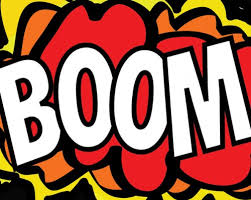

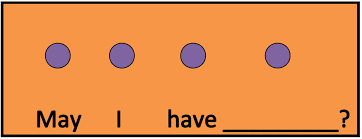
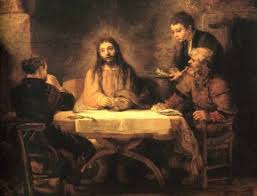
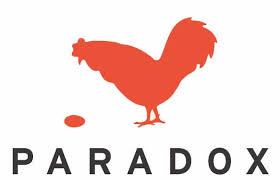
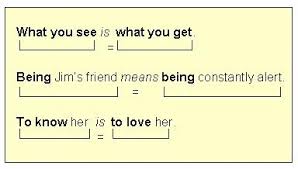


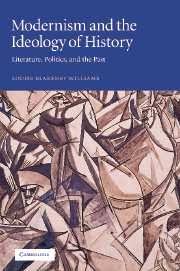





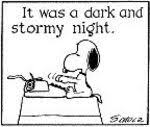


82. Omniscient Point of View:
knowing all things, usually the third person.
83. Onomatopoeia: use of a word whose sound in some degree
imitates or suggests its
meaning.
84. Oxymoron: a figure of speech in which two contradicting
words or phrases are combined to produce a rhetorical effect by means of a
concise paradox.
85. Pacing: rate of
movement; tempo.
86. Parable: a story
designed to convey some religious principle, moral lesson, or general truth.
87. Paradox: a statement
apparently self-contradictory or absurd but really containing a possible truth;
an opinion contrary to generally accepted ideas.
88. Parallelism: the principle in sentence structure that states
elements of equal function should have equal form.
89. Parody: an imitation
of mimicking of a composition or of the style of a well-known artist.
90. Pathos: the ability
in literature to call forth feelings of pity, compassion, and/or sadness.
91. Pedantry: a display of learning for its own sake.
92. Personification: a figure of speech attributing human
qualities to inanimate objects or
abstract ideas.
93. Plot: a plan or scheme to accomplish a purpose.
94. Poignant: eliciting
sorrow or sentiment.
95. Point of View: the attitude unifying any oral or written
argumentation; in description, the physical point from which the observer views
what he is describing.
96. Postmodernism: literature characterized by experimentation,
irony, nontraditional forms, multiple meanings, playfulness and a blurred
boundary between real and imaginary.
97. Prose: the ordinary
form of spoken and written language; language that does not have a regular
rhyme pattern.
98. Protagonist: the central character in a work of fiction;
opposes antagonist.
99. Pun: play on words;
the humorous use of a word emphasizing different meanings or applications.
100. Purpose: the intended result wished by an author.
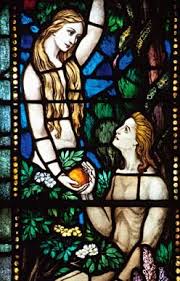
Tuesday, February 5, 2013
Lit Terms 57-81
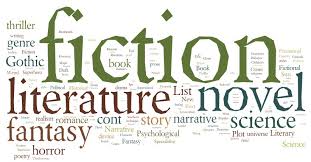
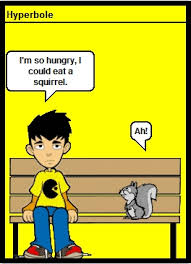

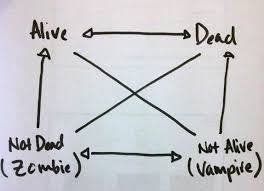

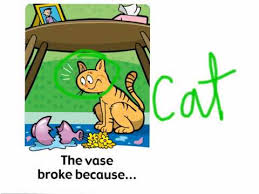

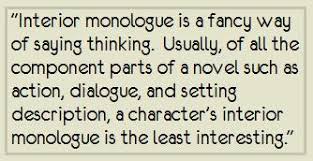



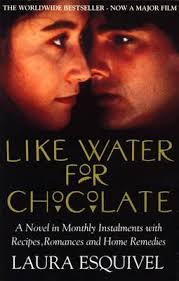

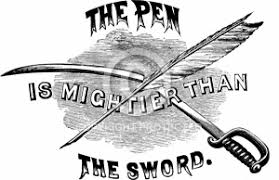





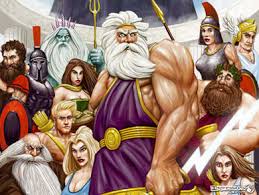


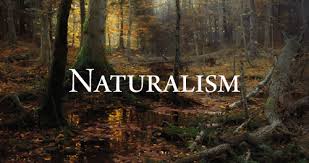
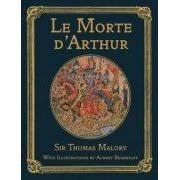
57. Genre: a category or class of artistic endeavor having a
particular form, technique, or content.
58. Gothic Tale: a style in literature characterized by gloomy
settings, violent or grotesque action, and a mood of decay, degeneration, and
decadence.

59. Hyperbole: an exaggerated statement often used as a figure
of speech or to prove a point.
60. Imagery: figures of speech or vivid description, conveying
images through any of the senses.
61. Implication: a meaning or understanding that is to be arrive
at by the reader but that is not fully and explicitly stated by the author.
62. Incongruity: the deliberate joining of opposites or of
elements that are not appropriate to each other.
63. Inference: a judgement or conclusion based on evidence
presented; the forming of an opinion which possesses some degree of probability
according to facts already available.
64. Irony: a contrast or incongruity between what is said and
what is meant, or what is expected to happen and what actually happens, or what
is thought to be happening and what is actually happening.

65. Interior Monologue: a form of writing which represents the
inner thoughts of a character; the recording of the internal, emotional
experience(s) of an individual; generally the reader is given the impression of
overhearing the interior monologue.
66. Inversion: words out of order for emphasis.
67. Juxtaposition: the intentional placement of a word, phrase,
sentences of paragraph to contrast with another nearby.
68. Lyric: a poem having musical form and quality; a short
outburst of the author’s innermost thoughts and feelings.
69. Magic(al) Realism: a
genre developed in Latin America which juxtaposes the everyday with the marvelous or magical.
70. Metaphor(extended, controlling, and mixed): an analogy that
compare two different
things imaginatively.
Extended: a metaphor that is extended or developed as far as
the writer
wants to take it.
Controlling: a metaphor that runs throughout the piece of
work.
Mixed: a metaphor that ineffectively blends two or more
analogies.

71. Metonymy: literally
“name changing” a device of figurative language in which the name of an
attribute or associated thing is substituted for the usual name of a thing.
72. Mode of Discourse:
argument (persuasion), narration, description, and exposition.
73. Modernism: literary
movement characterized by stylistic experimentation, rejection of tradition,
interest in symbolism and psychology
74. Monologue: an
extended speech by a character in a play, short story, novel, or narrative
poem.
75. Mood: the
predominating atmosphere evoked by a literary piece.
76. Motif: a recurring
feature (name, image, or phrase) in a piece of literature.
77. Myth: a story, often
about immortals, and sometimes connected with religious rituals, that attempts
to give meaning to the mysteries of the world.
78. Narrative: a story or
description of events.
79. Narrator: one who narrates,
or tells, a story.
80. Naturalism: extreme form of realism.
81. Novelette/Novella: short story; short prose narrative, often
satirical.
Subscribe to:
Comments (Atom)